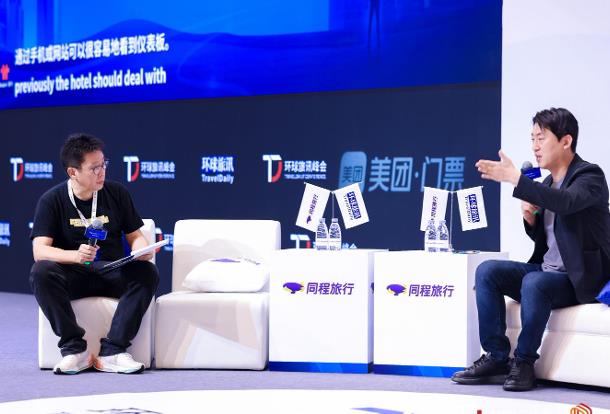Smart travel itinerary planner Mioji Travel had completed its B Round Financing raising US$20 million from lead investor BAI, and other investors including Morningside Venture Capital and DCM. Mioji intends to progress from polishing products to marketing and promotion following this round of financing.
Mioji offers a one-click tool for purchasing travel products. Its CEO Fan Zhang admitted that the company only has a few thousand internal test users, and that it was “a bit of luck” to have won high-value financing based on that, but he thinks investors are drawn to Mioji for a few factors.
Mr Zhang said the investors are impressed that the product logic are well thought through, “though it doesn’t necessarily mean the result will be right, but it does show that it is thoroughly considered”.
He thinks investors are also impressed by the company’s strong implementation capabilities, evident in its sticking to the direction of finessing the product since its launch in January last year. Zhang is thankful that the investors didn’t put pressure on the company in the process, and the product building process has gone smoothly.
Mr Zhang also believes that the high technological bar and the possibilities of the sector are also drawcards. He said about 80% of nearly 100 employers are in R&D, most of them hailed from traditional search engine giants such as Sogou, Tencent and Baidu, ensuring that they are advance in their work. The company has applied for a few patents for its products. Investors are also convinced that it's highly possible that Mioji’s work will become really big and that they also believe in “worry not about the risks but the lack of room to grow”.
Mioji’s business is about connecting information in high speed, which is the sole purpose of the internet, and opportunities arise when information flow is not smooth. Citing as example the air ticketing service in tour operator branches in the early days, Mr Zhang said that online agent service has decimated offline services as the business model of Ctrip and Qunar matures, since there is zero marginal cost for the online model.
On the other hand, travel companies spend hundreds of billion yuan every year to do one thing – to channel destination information to users. Even with the high costs, the service is still not enough to satisfy the personal needs of users, and very often users feel conned. However, travel agents still exist because offline service provides a complete (though not necessary perfect) solution that enables immediate purchase. On the other hand, online users will go through the process of checking out strategies, how others put together itineraries, do searches of OTAs and then finalize the itinerary and complete the purchase. Mr Zhang the process is how users string together dots to form a line, and the missing link online is products that are already strung together in a line.
However, it’s difficult to string together fragments as users have to have lots of information about attractions, air ticketing and accommodation. The time cost is enormous and that explains why independent travel is still just a niche market. Worse still, users may not arrive at the optimum solution even if they put in the time to get to grips with the offerings.
Mr Zhang hopes to use “machines” to solve the problem. Travel decision involves subjective and objective decision-making. As subjective decisions are mostly based on content, which is made before the user began choosing a destination, Mioji steers clear of this area. Instead, it focuses on objective decisions, based on ratings and ranking that machines are best at – using backend technology to provide the optimal choice for users.
This is by no means a simple task. Mioji’s databank has to connect all the points of information (POI) of all destinations in the world (primarily Europe at the moment), as well all the other information between these POIs – including minor transportation information (such as railway, airport shuttle schedules), hotel, major transportation information (e.g. schedules, changing prices). This involves having hundreds of million of POIs and dealing with thousands of information renewal from the extranet. Mioji leverages the power of 150 machines to solve the backend issue.
On the basis of data, Mioji asks users to state their preferences of itinerary (of price range, timing and comfort level) and hotels (star rating and location), and then provides an optimal solution using an integrated algorithm (through filtering and structuring data and then produce ranking using big data). The optimal solution may not be the cheapest or the most time saving, but it will have the highest score taking all factors into account.
Users can make direct purchase of the itinerary solution. This will become a major management challenge for suppliers, and Mioji tackles this by using major suppliers with ample servicing capacities, avoiding B2B platforms and GDSs and steering clear any service areas to maintain the focus on technology rather than service model. In order to stay tuned with dynamic price changes, Mr Zhang said Mioji uses improved algorithm to pick out data when they change, rather than checking data frequently.
After the itinerary is generated, users may be directed to suppliers’ sites to make purchases, or they can do it in one click on Mioji, for a fee, and Mioji can guarantee the quoted prices if the transaction is completed within 10 minutes.
Mr Zhang expects to push the product in the market at the end of the year and use subsidies to attract users initially to fine tune the product. The plan to expand user base will be carried out next year or even the year after.
One drawback of the Mioji product is incomprehensive coverage of destinations. At the moment, the service only covers key cities in Europe. Mr Zhang said they have to live with the limitation as the amount of data for adding one city goes up exponentially, and it will lengthen the time it takes to come up with an optimal solution and stress the server, ultimately affecting the accuracy of the result. In weighing up the pros and cons, he opts for meeting the majority demand first and ensuring accuracy.
Mioji seems to go after the same users as Qyer itinerary planner, but Mr Zhang thinks that Mioji is not for the experienced independent travelers who tend to go for unusual destinations. Instead, Mioji is useful for those who are heading to Europe for the first time. “We are taking users from among those who used to go on tour groups,” he said.
These users tend to go for the iconic cities (this is Mioji’s strength), and they follow tour groups because they are not sure of their ability of traveling on their own yet they don’t want to be restricted by tour group arrangements.
He said travel product design in general based very much on understanding of customers, yet customers needs change a lot and are individualized. The only way to go about it is go for the mainstream. (Translation by Shuk)




